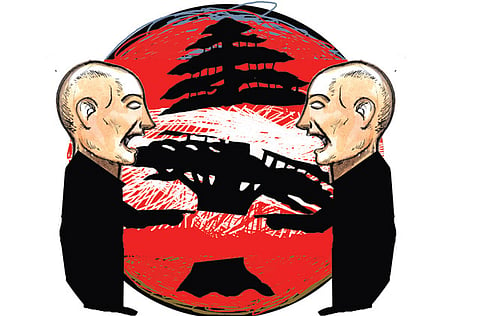Afflicted by the Junblatt syndrome
Lebanese need to urgently abandon the culture of sectarian rhetoric

Even if the government in Lebanon is nearly paralysed, with the moribund ‘National Dialogue' in a state of perpetual suspension, life is good in the Land of the Cedars. To be sure, legitimate accusations against the president of the republic, the prime minister and the speaker of Parliament fill the airwaves, with political preoccupations dominating most conversations.
Yet, these are not as prevalent as many assume, for more important concerns dictate everyday life. Moved by an enviable entrepreneurial spirit, the Lebanese argue and fight, but seldom stop building. A few leaders bank on sectarianism to fuel unquenchable thirsts for power although many more display courage as they plan for the future. Who will prevail?
Speaking at a secondary school a week ago, the head of the Free Patriotic Movement in parliament, General Michel Aoun, rejected any reliance on Westerners to support Lebanon. Allegedly, leading countries like the US, France and Britain, targeted Hezbollah and wished to destroy it. Aoun reiterated the claim that the Party of God never used its weapons against fellow citizens that conveniently glossed over the tragic May 7, 2008 clashes.
Aoun affirmed that when he was in Washington in 2005, former US president George W. Bush and his French counterpart, Jacques Chirac, planned to overthrow the Syrian Baath regime too, only to replace it with a Sunni Islamist entity. In what was a truly bizarre turn of logic, Aoun insisted that the Shiite community was the only one with which he had no problems. He claimed that in 1943, 1957, 1958, and 1975, Lebanon's predicaments were with Sunnis.
"Sunnis," he avowed, "were engaged in a struggle for power at home and have no principles like the Shiites and us." "My solidarity," he continued, "is with the Shiites."
This was not the first time that the parliamentarian was spewing ethnic hatred and, under normal circumstances, such demeanour would be laughable. Yet, Aoun was not the only representative who altered perspectives and dramatically distorted his beliefs for specific political goals.
Walid Junblatt, the scion of a leading Druze clan, embarked on a similar path. A foe of the Syrian regime after the 1977 assassination of his father, the erudite and spiritual Kamal Junblatt, Walid became a founding partner of the 2005 Cedars Revolution.
At the height of the 2008 political crisis, which delayed the election of a new president, Junblatt maintained that Syrian and Iranian interferences in the country's internal affairs prevented a normal constitutional process. More adamant than most, and after the Doha conference, Junblatt declared that it would be a significant failure for the United Nations if its inquiry into the assassination of prime minister Rafik Hariri failed to identify culprits.
The skillful politician's latest epiphany occurred earlier this year when he issued a formal apology to Syrian President Bashar Al Assad, asking for forgiveness for any offences he may have committed "during a moment of anger." "I used inappropriate language," he told Al Jazeera interviewers, which was enough to secure a visit to Damascus where a full-fledged reconciliation was duly consummated.
Junblatt was soon followed by Prime Minister Sa'ad Hariri, the son of the murdered official, who literally exonerated Damascus when he told Asharq AlAwsat that it was a "mistake to accuse Syria."
In the event, while Aoun, Junblatt and even Hariri complicated the work of the Special Tribunal for Lebanon (STL), discussing the pending STL indictment is a largely futile exercise. In time, the STL will issue indictments, which may or may not lead to a renewed civil war even if few have the courage to correctly assess the repercussions of such confrontations.
In politics, one is entitled to change one's mind but one is seldom allowed to bargain with principles. Going back and forth, which is the very definition of the Junblatt syndrome, illustrates a lack of principles. Lest one assume that such criticism is levelled at the named officials, one might as well add President Michel Sulaiman to the list, whose electrifying inauguration speech — in which he pledged to stand by the country's democratic institutions — was peerless. Little of those commitments survived.
Lebanon needs nationalists. Men like Ahmad Asaad, Dory Chamoun, Tammam Salam, Carlos Edde, and others to assume a far greater share of responsibilities.
Like Hezbollah leaders themselves, who perfectly illustrate what it means to have principles and to stick to them, a new generation of dreamers must step up to the plate to replace those who spew venom and who seek self-aggrandisement.
It is time to turn the page without falling into new traps as contemplated by French Foreign Minister Bernard Kouchner who revealed a "desire" to achieve a new agreement on Lebanon. It may be useful to remind the Frenchman that an accord inked in Ta'if awaits implementation.
The Lebanese need to urgently abandon the culture of the loud mouth that threatens ad nauseam, for Beirut was founded on the rule of law, even if few were applied. Those with convictions, who have clear visions, and who are willing to co-exist are the solution.
Those afflicted with the Junblatt syndrome cannot possibly prevail because merchants who sell the sectarian elixir are little more cheap soothsayers.
As for Junblatt himself, no one should be surprised when he switches back, as that is bound to happen sooner than many assume.
Dr Joseph A. Kechichian is a commentator and author of several books on Gulf affairs.
Sign up for the Daily Briefing
Get the latest news and updates straight to your inbox


